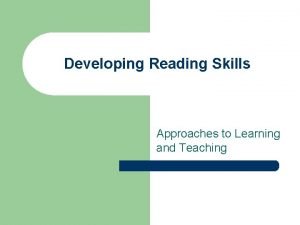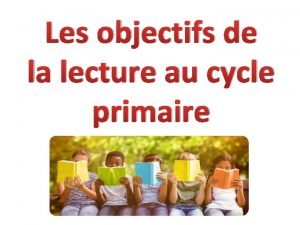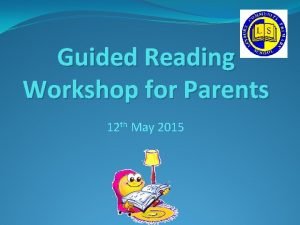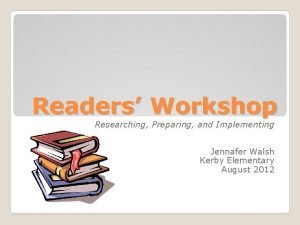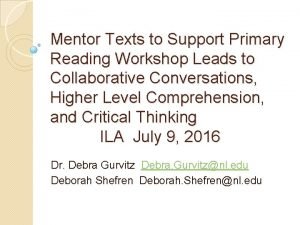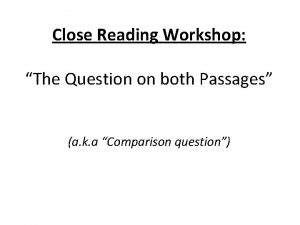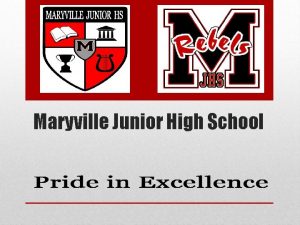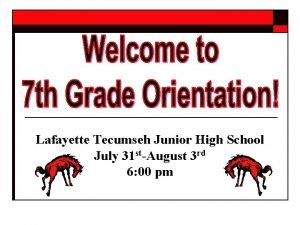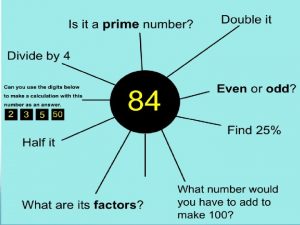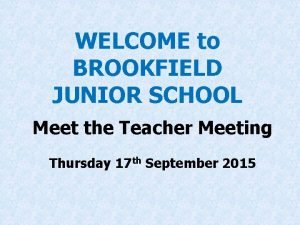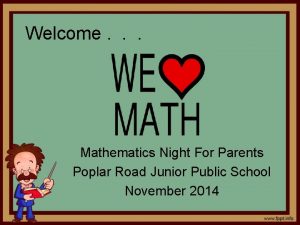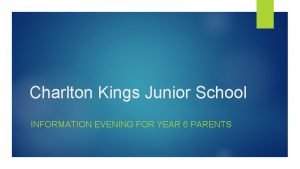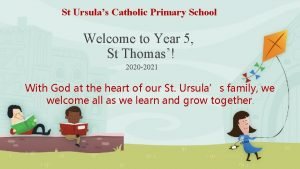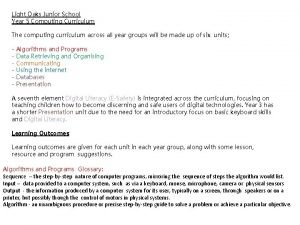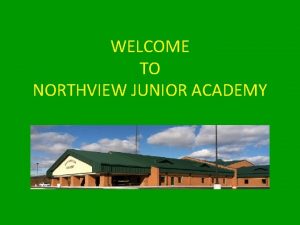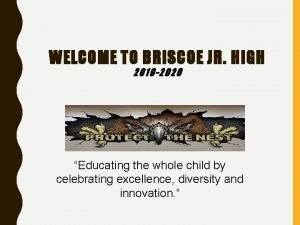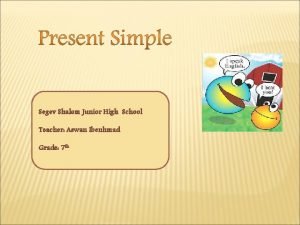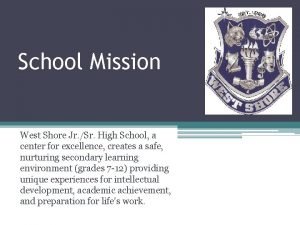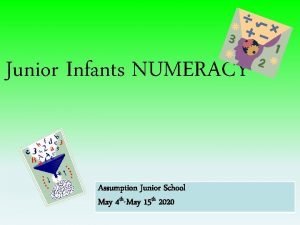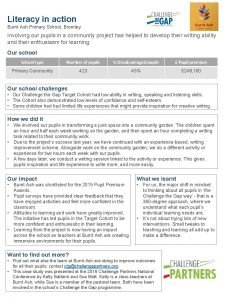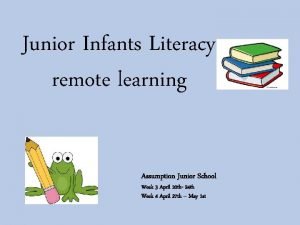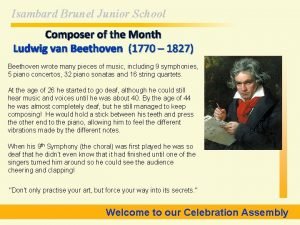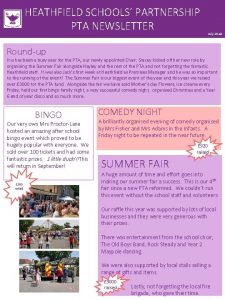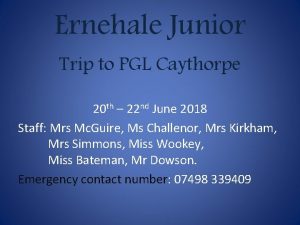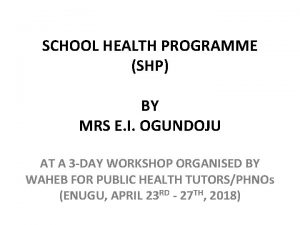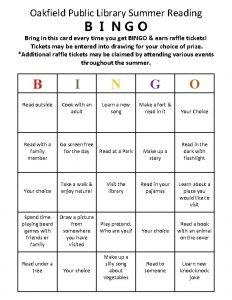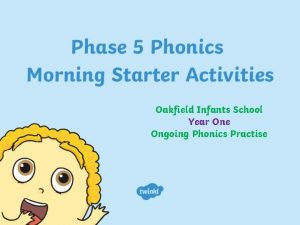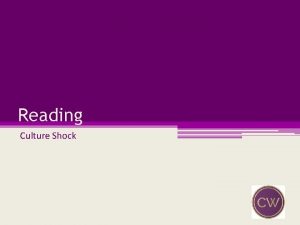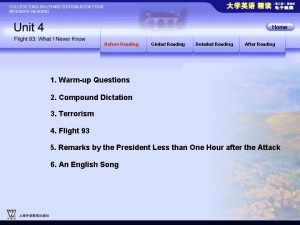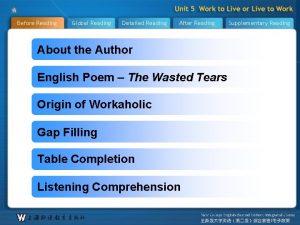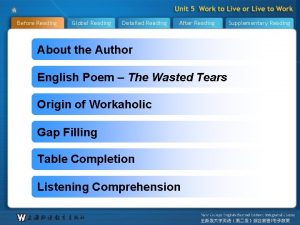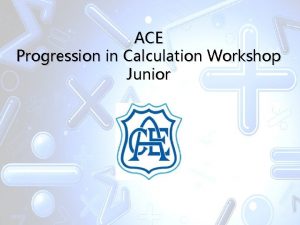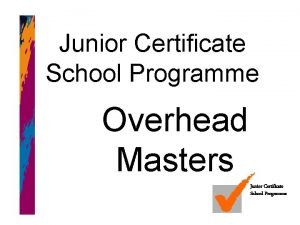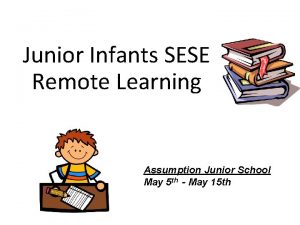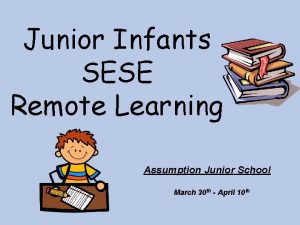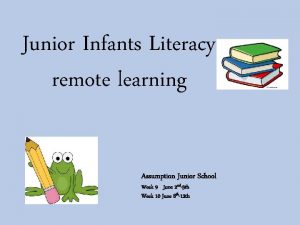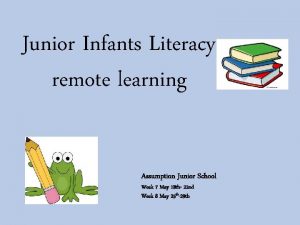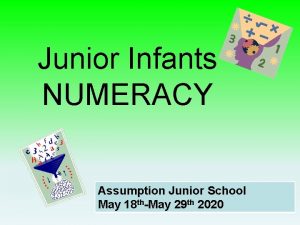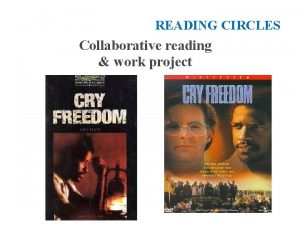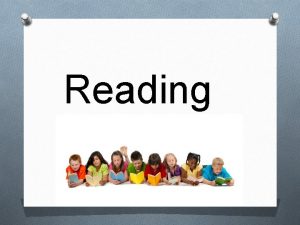Reading Workshop Oakfield Junior School Aims of the









































- Slides: 41

Reading Workshop Oakfield Junior School

Aims of the session: �To outline some of the difficulties children face when learning to read �To explain how we teach reading at Oakfield �To show you ways in which you can support your child at home with reading

At Oakfield, we aim to encourage our pupils to have a lifelong love and enjoyment of reading.


Word Recognition Comprehension Skilled word reading involves both the speedy working out of the pronunciation of unfamiliar printed words (decoding) and the speedy recognition of familiar printed words. Good comprehension draws from linguistic knowledge (in particular of vocabulary and grammar) and on knowledge of the world. Comprehension skills develop through pupils experience of high quality discussion as well as from reading and discussing a range of stories, poems and nonfiction.

Good language comprehension Poor word recognition + Good word recognition Good language comprehension - + Poor word recognition Poor language comprehension - Good word recognition Poor language comprehension What kind of reader is your child?

Effective adult readers use a range of flexible reading comprehension strategies so quickly and automatically… we hardly notice they are taking place!! The price we pay for our expertise is that the strategies we use have become hidden from us.

Word Recognition �Pupils who find decoding the words n the page challenging often have a poor phonemic awareness and limited phonic knowledge. �They can’t hear the different sounds in words. �They do not recognise the sounds that different letter strings make. �They need to use a range of strategies to enable them to read the words on the page

Phonemic awareness The ability to identify, think about and manipulate the sounds in speech. To promote phonemic awareness, children need to be able to: 1. Listen 2. Notice rhyme - know that sounds have meaning and follow certain patterns 3. Notice syllables – know that words can be split into smaller parts

Phonics The ability to segment and manipulate the sounds of oral language. The goal of Phonics is to enable readers to decode new written words by sounding them out – it is the first strategy that should be taught in helping them to learn to read.

Skills involved in the teaching of Phonics GPC’s: Grapheme/Phoneme correspondence. Children are taught all the phonemes (sounds) and the ways of writing them down. These are taught in a particular order.


Phonemes and Graphemes �See sheet at tables �One example – er sound has 6 different graphemes ur, ir, ear, or, ar �Burn, first, fern, heard, work, dollar



What can you do at home to support your child with Phonics? Talk about words and signs when you’re out and about Play rhyming games https: //www. phonicsplay. co. uk/Phase 5 Menu. htm Play word games – crosswords, word searches, Boggle

Get your child reading �Comics �Recipes �Cereal boxes �Road signs �Number plates

Other strategies to help with reading the text �Using the pictures to help work out the missing word �Reading on to the end of a sentence to predict the missing word �Using knowledge of word types to work out what type of word is missing

Factors that influence poor comprehension

Weak background knowledge �When reading an extract of text about building towers and a wave knocking it over – a child could picture towers made from bricks as he had never been to the beach before – hadn’t spotted the VIP word – wave. �Billy was howling because his whole day had been spoilt. All his work had been broken by the wave. His mum came over to help but she accidentally stepped on the one tower that was left. “Never mind, ” she said. “Let’s go back for tea. You can build some more towers tomorrow. ”

Limited Vocabulary �A reader must know at least 90% of the words in a text to comprehend it I libbled spig in the croopit on a Morflip hicklepulg. It was filp after we yambled into Huphlup Greep. The webble was yisking. Blord had ippen we’d be yambling just in shrud for the exime. Troosey ugo was there. Just me. The greks were inside the volda with Yabba Hoost, mirriming about the diggle.

Working memory �Tasks that involve storing large pieces of information can be difficult for those children with a poor working memory

Asking questions and making predictions �Good readers are active readers who ask questions and make predictions The photograph of the newly discovered star was on the front page. What star?

Ok… That sort of star

Comprehension monitoring � Good readers listen to self, check reading makes sense, detect errors and repair. � They make/build pictures in mind � Make links between the text and their background knowledge � Notice VIP words � Predict and ask questions

Spot the mistake Moles It is very dark underground but for some animals it’s home. For example, moles are small dark creatures that can tunnel at high speed. They have sensitive noses and they can see very well. A mole can dig a tunnel as long as a football pitch in one night. Moles are very shy and only wake up at night but then they get moving. They are fantastic diggers but they don’t see very well. Have you ever seen lots of small mounds on a field? Watch out there’s a mole about!

Inference � Inference is the bedrock of comprehension. � Good comprehension involves going beyond the literal meaning of text. � We make links between sentences, use knowledge of books and background knowledge to generate inferences. � The answers are not all in the text. Readers have to bring plenty of things to it to get the full meaning. � Accessing background knowledge is crucial to making inferences.

Using inference to establish meaning of unknown words Jay lay down on his stomach, and gripped the edges of the luge as it rushed down the snowy mountain. 2. Abe was in love with comedy and like other farceurs before him, wrote prolifically. 3. The potter maleated the clay by kneading, rubbing and adding water. 1.

Strategies to help us understand enjoy reading 1. 2. 3. 4. 5. 6. 7. Use our background knowledge and connect to text Predict, ask questions, I wonder…. Visualise Think like a detective, use inference Notice breakdown and repair Watch out for VIP words Put together to build the gist

How do we teach your child to read? Book Fairs Book weeks Guided Reading Independent reading Shared reading Library Comprehension lessons Spelling lessons Reading & Spelling intervention

Insert example carousel

7 different Assessment focuses for Reading �AF 1 – Reading the words on the page �AF 2 – Using literal retrieval �AF 3 – Using Inference to understand the text �AF 4 – Understanding structure and organisation of a text �AF 5 –Understanding the language used in a text �AF 6 – Understanding the purpose of the text �AF 7 – Relating the text to social, cultural and historical traditions

Example Okay, so I admit that the first day of school I was so nervous that the butterflies in my stomach were more like pigeons flying around my inside. Mom and dad were probably a little nervous too, but they acted all excited for me, taking pictures of me and Via before we left the house since it was Via’s first day of school too. Even though Beecher Prep is just a few blocks from our house, I’ve only been on that block a couple of times before. In general, I try to avoid blocks where there are lots of kids roaming around. On our block, everybody knows me and I know everybody. I know every brick and every tree trunk and every crack in the sidewalk. I know Mrs Grimaldi, the lady who’s always sitting by her window, and the old guy who walks up and down the street whistling like a bird. I know the deli on the corner where mum gets our bagels, and the waitresses at the coffee shop who all call me ‘honey’ whenever they see me. I love my neighbourhood of North River Heights, which is why it was so strange to be walking down Focus for session: AF 5 Understand language, technique and style. 1. What simile has been used to show the boy is feeling? 2. Why does the author compare his feelings to pigeons flying? 3. Why does the author describe the boy’s block in detail? 4. Find a simile that shows the boy is comfortable on his block. 5. Find a copy two words to show the boy is nervous on his first journey to Beecher Prep. Follow up Task for tomorrow’s session: Find the meaning of these three words:

End of KS 2 assessments �The test consists of a reading booklet with 3 texts (approx 2, 300 words) and a separate answer booklet. �The expectation for vocabulary understanding and stamina is high. �They have a total of 1 hour to read the texts and answer the questions and it is marked out of 50.

Look at the paragraph beginning: Glancing nervously…. Find and copy one word meaning relatives from a long time ago.


What can you do to support your child at home? Make reading � Share books with your child � Hear your child read daily � Talk around the text � Ask questions � Offer your own ideas � Encourage wide reading – fun! Encourage your child to enjoy books everyday! range of genres � Using libraries � Be enthusiastic about the ‘Reading. Your child is never too old for you to Challenge’ (Reading raffle) read to them or for � Read a range of things! them to read to you. (From newspapers to packaging!)

Recommended questions �See sheet at your tables �The questions are broken down into the 7 assessment focuses

Recommended texts Help yourself to recommended reading lists. There is one for each year group broken down into genres.

Finally … �Supporting your child to read is the most important thing you can do to help your child succeed �Your child’s ability to read directly impacts their ability to write �The impact lasts a lifetime; successful readers tend to be more imaginative and confident �Children learn by example so if they see you reading they are likely to want to join in �Talk, talk! More able readers are better speakers. The wider and richer their vocabulary and knowledge and their experience of the world, the better their comprehension will be

Any questions?
 Pre reading while reading and post reading activities
Pre reading while reading and post reading activities What are the aims of teaching reading?
What are the aims of teaching reading? Types de lecture au primaire
Types de lecture au primaire Guided reading workshop
Guided reading workshop Pros and cons of reading workshop
Pros and cons of reading workshop Mentor texts for reading workshop
Mentor texts for reading workshop Dentify a key term used in both passages.
Dentify a key term used in both passages. Hopkins north junior high school
Hopkins north junior high school Sunnymede junior school
Sunnymede junior school Plum grove junior high
Plum grove junior high Maryville junior high school
Maryville junior high school Powerschool lsc tecumseh
Powerschool lsc tecumseh Shottermill junior school
Shottermill junior school Sprowston junior
Sprowston junior Jenifer junior high
Jenifer junior high Brookfield junior school larkfield
Brookfield junior school larkfield Poplar road junior public school
Poplar road junior public school Charlton kings junior school
Charlton kings junior school St ursula's catholic junior school
St ursula's catholic junior school Light oaks school
Light oaks school Gomer junior school
Gomer junior school Fifth ward jr high
Fifth ward jr high Northview junior high school
Northview junior high school Briscoe jr high
Briscoe jr high Shalom junior school
Shalom junior school Westshore junior senior high school
Westshore junior senior high school Assumption junior school
Assumption junior school Burnt ash junior school
Burnt ash junior school Assumption junior school
Assumption junior school Isambard kingdom brunel isambard brunel junior
Isambard kingdom brunel isambard brunel junior Isambard kingdom brunel isambard brunel junior
Isambard kingdom brunel isambard brunel junior Isambard brunel junior school
Isambard brunel junior school Heathfield junior school partnership
Heathfield junior school partnership Pgl sample menu
Pgl sample menu Aims of school health programme
Aims of school health programme Hát kết hợp bộ gõ cơ thể
Hát kết hợp bộ gõ cơ thể Frameset trong html5
Frameset trong html5 Bổ thể
Bổ thể Tỉ lệ cơ thể trẻ em
Tỉ lệ cơ thể trẻ em Gấu đi như thế nào
Gấu đi như thế nào Tư thế worms-breton
Tư thế worms-breton Alleluia hat len nguoi oi
Alleluia hat len nguoi oi
